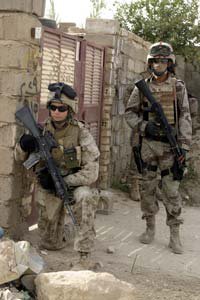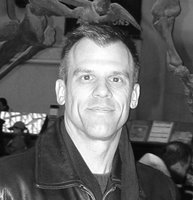To All Who Shall See These Presents, Greetings
These lines are spoken first at any military awards or promotions ceremony. I thought them fitting to start my post today, since it is Veterans Day. All Veterans alive or gone deserve our thanks today. I am especially humbled by the sacrifices made by their families. Below is an article sent to me from a buddy in Iraq about their constitutional election last month...stirring.Before I conclude, thanks to all those who commented on my first post. My first 24 hours as a blogger were cool, and I can tell there's a lot of passion and energy out there.
A few notes about training before I conclude: I'm running the Old Reliable 10K this weekend. My goal is to break 48 minutes. In the Dalmation Dash 8K last weekend, I ran 37:55 (7:39 per mile). More to come!

A Resentful Vote Amid deserted streets, Sunnis in Iraq’s insurgency-ridden Anbar Province swallow their bitterness and vote on a new constitution.
NEWSWEEK’s Owen Matthews recounts his day with U.S. Marines in Fallujah.
WEB EXCLUSIVE
By Owen Matthews
Newsweek
Updated: 8:17 p.m. ET Oct. 15, 2005
Oct. 15, 2005 - 7:30 a.m.: Only a few vegetable vendors and children playing move on the empty streets. Cars are banned today for fear of car bombs. About one kid in three waves at our convoy as we drive into Fallujah from the downtown Marine base—a relatively warm reception. We have heard one explosion early in the morning—an unsuccessful bomb attack on a U.S. convoy.
8:30 a.m.: Voters massively resent the government and the Iraqi security forces. Perhaps surprisingly, Fallujans seem to resent the Iraqi army, largely dominated by Shias, far more than the Americans. One man calls the Iraqi Army an "occupation force." People passionately hate Iraqi Prime Minister Ibrahim Jafari and his government. When pressed to say which politician they most respect, many Fallujans say Ayad Allawi, the U.S.-installed prime minister who preceded Jafari. He quickly allocated $200 million to rebuild their city after the U.S. war on insurgents in November 2004. Jafari seems not only to have ignored Fallujah but also deployed Shiite security forces in the mainly Sunni city.
"Jaafari? Go outside and see—there’s nothing but damage; half of our house was destroyed in the fighting last November and we still have not been able to repair it," complains Juma Abid, 30, an engineer. "Of course Allawi was much better than Jafari," says Abu Yasif, 28, a teacher. "It’s a rule. The last premier was better than this one, the last interior minister was better than this one. Things are getting worse for us Sunnis."
Sheikh Anad Aboud, 65, a tribal leader in a flowing robe and white headdress, said Allawi had been less sectarian. "Yes, he ordered operations in Fallujah, but he ordered operations in Najaf too," said the elder.
9:00 a.m.: "The government are just a bunch of liars," complains 42-year-old Yussuf Al’ Lami, standing in a huddle of his neighbors and children in a dusty street corner near a polling station in the Fillistin area of Fallujah. "They want just to annihilate Sunnis. They don’t want us to vote or have a voice in Baghdad. No one in Baghdad cares about us."
But the enthusiasm for Allawi is muted, at best. Some Fallujans also vehemently resent the rule of exiles. "We need a real Iraqi. These people sitting at desks now, they say they represent the Iraqi people but they have never passed through the real Iraqi experience," says Muntasar Al Alwani, a 36-year-old businessman. "Allawi is no better than any of those other politicians who came to our country on the back of American tanks."
10:00 a.m.: The Muslim clerics, or sheikhs, of Fallujah, are trusted above all politicians. Rafeh Al Wan, 48, retired movie producer, gave a typical response: "I trust the Ulema [clerics’ council] above all, they are the ones who have the interests of all Iraqis at heart," he said. "We need the Ulema to give an Islamic flavor to the government. You ask what Jafari did wrong—I ask what he did right? We feel no security here. My wife is a Shiite, she is the mother of seven kids, we have no problems in our family with Sunni, Shia, Kurds. This is all new. All I know is that before we were secure and now we are scared."
11:00 a.m.: Some people wax nostalgic for the days of Saddam. About one in five of the men I spoke to today support him outright (though more, about three in five, said they most respect the Ulema Council). "Bring back Saddam. He’s better than all of these people," said Sheikh Anan Aboud, 65. "Under the former regime things were better, the roads were safer. He was an oppressor but this gang is worse. We believe that [Abu Musab al-] Zarqawi was a legend invented by the Americans."
4:00 p.m.: U.S. Ambassador Zalmay Khalilzad arrives at the Civilian-Military Operations Center in downtown Fallujah in a heavily armored humvee. I’m napping on a cot in the sandbagged hall when he arrives to meet with local leaders. Cots, kitbags and Marines’ laundry fill the room, once a theater. Sheikh Kamal Shawkur, chairman of the Fallujah City Council, begs for local boys held in Iraqi prisons to be turned over to the Marines. "At least we know that with the Marines they will be back in a month, a year," Shawkur told Khalilzad. "With the Interior Ministry you never know if you will ever see them alive again." Fallujah’s police chief General Salah Al Ani asks Khalilzad to allow 70 former Army officers to join the police, despite an Interior Ministry veto (on anti-Baathist grounds). "Of course Baathists should be allowed to stay in positions of power," says Gen. Salah. "We are all Iraqis in the end. Why call them ‘ex-Baathists’—ask if they are good Iraqis. The biggest mistake was to dissolve the army—I would like to ask [former U.S. administrator Paul] Bremmer why he did that."
The local dignitaries ask Khalilzad for two more things—to give Anbar Province more parliamentary seats than the current nine (which they reckon is too few), and to release money due for reconstruction and compensation.
Khalizad seems in his element. Fawzi Mohanad, deputy head of the city’s reconstruction council, says that the government owes the city $400 million. Khalilzad comes back with $110 million, and promises to work on it in Baghdad.
But when Sheikh Kamal Shawkur, chairman of the Fallujah City Council, mentions "the situation before 2003" as a benchmark for Sunni representation, Khalilzad steps in with a reality check. "We worry that people are nostalgic about the past," he says. "The past was not that good in Iraq. Iraq could do much better." The City Council chief invites him to break the Ramadan fast. Khalilzad says he has to meet the prime minister. The Fallujans smile politely.
6:00 p.m.: We dine on Meals Ready to Eat as polls close.
9:00 p.m.: Lt. Col. Patrick Carroll, the Arabic-speaking Marines Foreign Area Officer for Anbar, serenades downtown Fallujah with his Scottish bagpipes, a nightly tradition. He stands in the middle of a boxing ring in the courtyard and plays a selection of patriotic Scot and American airs, culminating in the Marine Hymn. The unit’s pet turkey, who lives under the boxing ring, appears calmed. The grunts say they’ve made the turkey a little joke ID card, which expires on Thanksgiving Day.
Midnight: As we prepare for bed, a State Department rep tells us that turnout has been very high in Fallujah, but low in the rest of Anbar province. "How low? Embarrassingly low?" we ask. "No, not embarrassing," he says. "Maybe just very low. But very high in Fallujah." That’s going to set off a lot of politicking—Fallujah has demonstrated that Sunnis can vote en masse (though they probably voted no). A lot of politicians will want to cultivate them in the two months before general elections in December.
© 2005 Newsweek, Inc.


0 Comments:
Post a Comment
<< Home